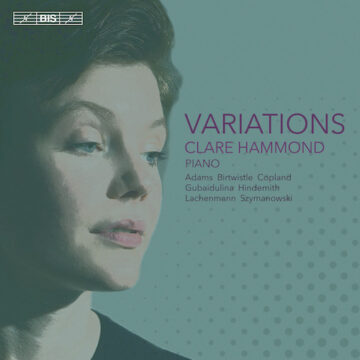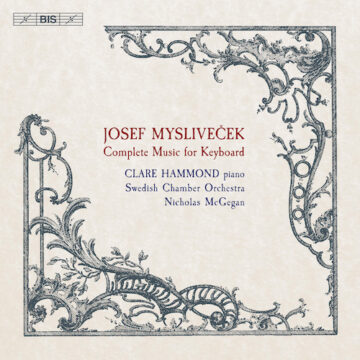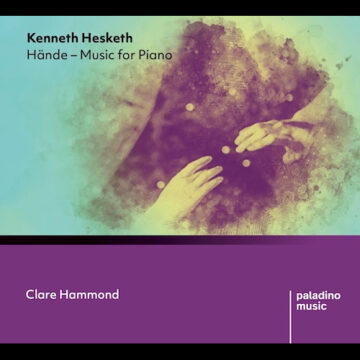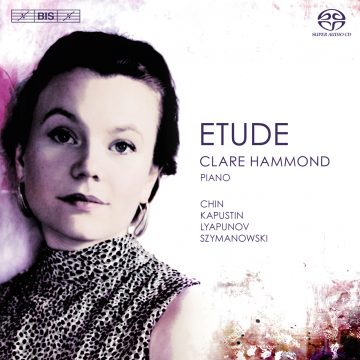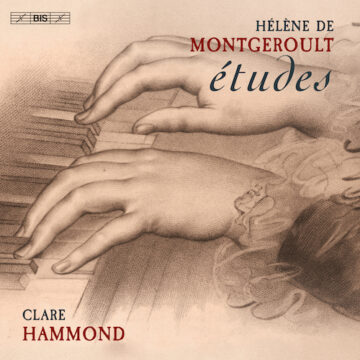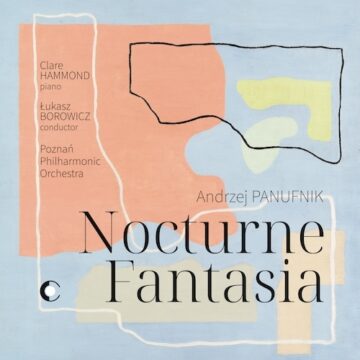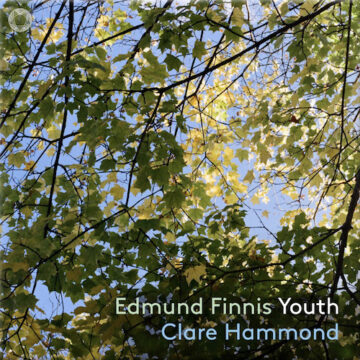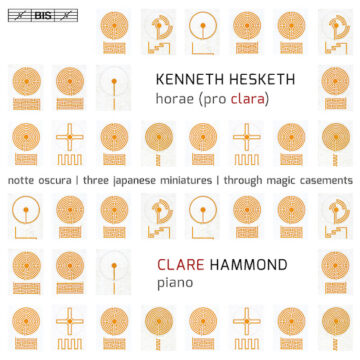Clare Hammond is recognised for her imaginative playing, visionary programming, and communicative performance style. She won the Royal Philharmonic Society’s Young Artist Award in 2016.
In 2024, she debuted at the BBC Proms, Konzerthaus Berlin, and Salle Bourgie in Montreal, and returned to the Wigmore Hall, London’s National Gallery, and Raritäten der Klaviermusik in Husum. She recorded a disc of concertos by Britten, Tippett and Walton with the BBC Symphony Orchestra and George Vass, performed Rachmaninov with the Bournemouth Symphony Orchestra and Tom Fetherstonhaugh, and Hesketh with the Ulster Orchestra and Anna Rakitina. She gave the second ever performance of the recently revived Fantasia by Andrzej Panufnik, more than sixty years after its premiere, with the Filharmonia Poznańska and Łukasz Borowicz.
Contemporary music is at the core of her work. She has given over 50 world premieres, including those of major works by Arlene Sierra, Robert Saxton, Jeffrey Mumford and Michael Berkeley, and her discography includes world premiere recordings of over twenty works. In 2019, she gave the world premiere of Kenneth Hesketh’s Uncoiling the River with Martyn Brabbins and the BBC National Orchestra of Wales, and a further performance with the Royal Liverpool Philharmonic and Vasily Petrenko. In 2022, she premiered Graham Fitkin’s new piano quartet with Fitkin, Ruth Wall and Kathryn Stott at the Aldeburgh Festival, and opened the Southbank Centre’s 22/23 season at the Queen Elizabeth Hall with the work. In 2025 she premiered a new concerto by Ninfea Cruttwell-Reade with the BBC National Orchestra of Wales.
She has recorded six discs for BIS, most recently releasing an album of Etudes by visionary French composer Hélène de Montgeroult, launched in a special concert at London’s National Gallery. It featured extensively on BBC Radio 3’s Composer of the Week and Essential Classics and was selected as Editor’s Choice in Gramophone. Reviewers noted the historical importance of the etudes
and the ideal match with Hammond’s virtuosic and lyrical abilities. She previously recorded a disc of 20th- and 21st-century
variations which received extensive critical approval, and a disc of etudes by Unsuk Chin, Nikolai Kapustin, Sergei Lyapunov and Karol Szymanowski which won her an Opus d’Or from Opus HD magazine and 5 diapasons from Diapason. Youth, an album of music written for her by Edmund Finnis won an Edison Klassiek Award and Presto Classical's 'EP of the Year' Award in 2024.
Community engagement forms an increasingly important part of her work. She recently founded the Gloucestershire Piano Trust to support her ongoing work in schools and prisons, which reaches around 4,000 schoolchildren and 300 prisoners each year.
This season, she makes her debut at the Royal Albert Hall performing Rachmaninov’s Second Piano Concerto with the Philharmonia Orchestra and Christopher Warren-Green and premieres a new concerto by George Stevenson with the Britten Sinfonia. Clare will record repertoire by Ravel, Tailleferre, Bonis, Barraine and Chaminade for BIS Records.
She completed a BA at Cambridge University, where she obtained a double first in music, and undertook postgraduate study with Ronan O’Hora at the Guildhall School of Music & Drama and with Professor Rhian Samuel at City University London. She completed a doctorate on 20th-century left-hand piano concertos in 2012. In 2014 Clare was paired with French pianist Anne Queffélec on the Philip Langridge Mentoring Scheme run by the RPS.
This biography is for information only and should not be reproduced.
British Piano Concertos
BIS Records, October 2025
Here’s an interesting prospect: three British (sort of) piano concertos, each from a different 20th-century decade, each offering different escape routes from those epic 19th-century boxing matches between a piano virtuoso and the orchestra. The unifying factor is the crisp artistry of Clare Hammond, whether she’s navigating the florid tendrils creeping over Tippett’s Concerto for Piano and Orchestra or pecking out the suggestive phrases that propel Britten’s Diversions using only the fingers of her left hand.”
“The album begins with Walton’s early Sinfonia Concertante, heard in its 1943 revision, not his most compelling piece, with the piano sometimes reduced to guest appearances in a tapestry that never quite knits together. Hammond and orchestra (the BBC Symphony Orchestra, conducted by George Vass) secure bigger rewards in the chiselled exchanges of the Britten, written for the one-armed pianist Paul Wittgenstein. Tippett’s hothouse effusions suit them too, even if the orchestra at times needs just a little more virility to match Hammond’s athletic flair.
The Times
It's been an age (55 years to be precise) since the last still underrated Sinfonia concertante in its 1943 revision (…), so a hearty welcome to Clare Hammond’s scrupulously prepared alliance with George Vass and the BBC So […] all give their formidable best, and to their number must now be added Clare Hammond, who locates a melting poetry and depth of expression in Variation 5 (‘Chant’), 6 (‘Nocturne’) and 10 (‘Adagio’), while not missing out on the virtuosic fireworks of those two linked toccatas that form Var 9 as well as the ‘Tarantella’ finale. A comparably selfless dedication, nourishing intellect and unfailingly questing spirit inform the illuminating performance of Tippet’s soaringly lyrical and luminously textured Piano Concerto (1953-55), written in the wake of his first opera, The Midsummer Marriage. Intensely concentrated and memorably articulate, Hammond is comprehensively equipped to tackle this music’s formidable technical challenges, her exquisitely variegated tonal palette, deft touch and quiet authority truly things of wonder.
Andrew Achenbach, Gramophone
it’s so persuasive…it’s such a musical dialogue, both in terms of how Walton has written this later version of the piece, but also the way Hammond plays it. She’s so utterly at ease in and out of the spotlight with moments of virtuosic really flashy fingerwork…it’s a really remarkable recording, again that really apparent ease…really ethereal glistening…some thunderous piano playing…it’s a great recording
Flora Wilson on BBC Radio 3 Record Review
Her sound carries a distinctive crispness — even in the most lyrical passages — that sets her apart from many amongst her generation. There’s a reassuring fastidiousness in the placing of every note. The second-movement solo line in Walton’s Sinfonia Concertante, delicately shadowed by the flutes, is a striking example: poised, lucid, and unshowy. Yet the clarity comes with a self-assured warmth. The movement’s swift harmonic shifts and intricately woven textures grow from careful decision-making — the kind of detail in music-making that acts as a powerful trigger for the imaginative listener.
Thoroughly Good
Hammond delivers Benjamin Britten’s 1940 Diversions for piano (left hand) and orchestra, leaving us in no doubt from the opening statement that this composer in his 20s knows exactly where he is going, what he has to say and how he means to express it. Written for the one-armed Paul Wittgenstein, it flopped on first performance and was long neglected. My reaction on hearing it again after several years is that you would not change one single note, so secure is Britten’s confidence in his gift. Beside him, others fade to sepia.
Norman Lebrecht, The Critic
This enterprising and well-filled programme of works for piano and orchestra is self-recommending for its contents almost as much as it is for the excellence of its soloist. You can always have confidence in Clare Hammond as a performer of whatever she turns her hands to, and so I was never going to turn down an offer to hear this release.
This is an excellent performance of another rarely heard work, full of contrasts as you might expect in a theme and eleven variations,[…] this is a must-have programme for seekers of mostly neglected and rarely performed mid-20th century British repertoire.
Dominy Clements, MusicWeb
Kenneth Hesketh: Hande - Music for Piano
Paladino Music, November 2024
This generously filled disc celebrates the longstanding and fruitful artistic partnership between composer Kenneth Hesketh and pianist Clare Hammond. Dating from 2006 to 2023, the contents includes several works written specifically for the performer. While the music offered here is searching and often technically demanding, the results are invariably engaging and illuminating.
Poetic Conceits (2006) is a set of six, unbroken movements in which the protean material is constantly being viewed in a different light, either through development or by varied restatement. Clare Hammond is poised and persuasive in this challenging piece, whether in the fiery opening Epigram, the impish Epigraph and the volatile Mad Pursuits, or in the vast stillness of the contemplative second movement and eloquent wistfulness of the opening of the fourth. By turns virtuosic, exploratory and visionary, this substantial piece, consummately played, makes a powerful opening statement.
The other two extended works presented in this conspectus are just as vivid and concentrated. Hände (2015), from which this album takes its title, is a wide-ranging, single-movement work that incorporates chiming desk bells and extended piano techniques. These diverse expressive means are employed solely to further a musical narrative that is far-reaching and, in the hands of Clare Hammond, deeply compelling. Written in 2023, Auszüge aus einem kleinen Totebuch ('Excerpts from a little book of the dead') is an elegiac tribute to the composer Joseph Horovitz, a friend and colleague of Kenneth Hesketh. Material from what is arguably Horovitz's greatest work, his fifth string quartet, is included in a musical argument that involves the occasional use of a Tibetan prayer bowel, a hand-held electronic bow, and plucked strings to enhance the music's rapt, devotional character. Clare Hammond's dedicated, poetic and finely realised interpretation touches the heart and always serves the music.
Of the four shorter pieces, two are memorial tributes: Pour Henri (2011) is a gentle, affecting homage to Dutilleux and Lullaby of the Land Beyond, written in 2018 in memory of Oliver Knussen, is mystically evocative. Heu, heu heu (2012) and Chorales and Kolam (2019) are birthday gifts, the first boisterous and the second thoughtful and intricately wrought.
Clare Hammond is an ideal exponent of Kenneth Hesketh's questing and distinctive keyboard scores. Bravura passages are handled with notable assurance and invention and the quieter, more inward aspects of the music are treated with devoted care and profound understanding. Richly documented and effectively recorded, this is an extremely desirable release.
Paul Conway, Musical Opinion, 5 stars
Rachmaninov’s Rhapsody on a Theme of Paganini
BBC Proms 2024
The solo pianist in Rachmaninov’s Rhapsody on a Theme of Paganini (1934) was Clare Hammond, who grew up in Nottingham. Noted for her refinement and virtuosity, she brought considerable panache and expressive sweep to the piece. Every section was sharply characterised in a fluently unfolding narrative that struck an ideal balance between playfulness and elegance. Bravura passages were delivered effortlessly, but brilliance for its own sake was never part of this consummate performer’s considered and imaginative approach to the music. Anna-Maria Helsing and the BBC Concert Orchestra provided keenly responsive support, ensuring this beloved mainstay of the repertoire sounded fresh and compelling.
There was a delightful, brief encore from the soloist in the form of Cécile Chaminade’s Etude Op.35 No.5, Impromptu. Clare Hammond was alert to every shift in mood and shade of colour in this delectably mercurial miniature.
Musical Opinion
Lakeside Arts / solo recital
Nottingham, 10 April 2025
Clare Hammond’s Nottingham recitals are always keenly anticipated, not only because she grew up in the city but also because her programmes are always so imaginatively planned and executed.
Clare is the ideal exponent of Ravel’s piano music. Its complexities require a formidable technique – and Clare certainly has that. In fact, it was a joy to see her fingers at work in pieces which require some extraordinary digital gymnastics....
More than anything, Clare’s playing explored the tension between the suite’s surface charm and its subtly darker undercurrents.
...Clare used her musical intelligence to bring into vivid focus the full range of Debussy’s intimacy, wit, brilliance, mystery and unfailing originality. Just as she had done with the rest of her programme, which also featured some richly mysterious Fauré and the delightful piece of Dutilleux which followed as encore.
William Ruff, Reviews Gate
Espresso-Konzert recital
Konzerthaus Berlin, September 2024
The main pleasure of the afternoon, however, was the concert by the English pianist Clare Hammond, who presented an unusual solo program, focusing on works by Hélène de Montgeroult and Cécile Chaminade.
Two years ago, Hammond dedicated an entire CD to de Montgeroult, who was born in 1764, which was honored with awards by the BBC and the British classical music magazine Gramophone. Hammond presented three of the Frenchwoman's varied etudes in her Berlin concert, which demonstrated pars pro toto the high level at which de Montgeroult composed. The harmonically interesting E-flat major Etude No. 62 and the urgent G minor piece No. 111 from the Cours complet pour l'enseignement du forte-piano are particularly worth playing more often in concert halls.
The pianist gave a brief account of the dramatic life story of Hélène de Montgeroult, who allegedly escaped death by guillotine in 1793 only because of her piano interpretation of the Marseillaise and who two years later became the first female piano professor at the Paris Conservatory.
Like de Montgeroult, Cécile Chaminade, who was almost a hundred years younger than her, was completely forgotten for decades, along with her compositional work. Even if the late romantic tone of Chaminade's etudes seems outdated from the time when they were written, her solo piano pieces are well worth rediscovering as timelessly beautiful music and a challenge for ambitious pianists. Clare Hammond is by no means the only pioneer to champion Chaminade's work, which also includes sacred works and at least one opera. But her concert was a reminder that the majority of audiences have missed out on a great deal of good music simply because works by women have hardly been on concert programs for a long time.
Which does not mean that Clare Hammond foregoes the far more well-known “male” repertoire. Beethoven’s Moonlight Sonata was one of the most popular piano sonatas ever on the programme. Have you heard it a thousand times? Maybe, but thanks to Hammond’s intimate, never pretentious interpretation, the beauty of the three movements was particularly touching. The last item on the programme of the one-hour concert in the Werner Otto Hall were three of Chopin’s Etudes op. 25, with the not-so-bitingly cold Winter Wind Etude No. 11 as the finale. And because the audience wanted to hear even more of Clare Hammond’s light-as-a-feather, precise and beautifully sounding playing, she presented one of her specialities as an encore: a piano etude by Unsuk Chin. She has studied the etudes in detail, which at first glance seem simple but are delightfully complicated. She gives tips on how best to work through them on the Internet and does not hide how complex and difficult she finds these “practice pieces” to be to play. Here too, Unsuk Chin’s etudes are worth playing and listening to. The audience at the Espresso concert thanked her for the rare experience with long-lasting applause
Das Orchester
Cheltenham Festival recital
Cheltenham, July 2024
Clara Schumann’s Three Romances, Op.21 (1853) benefitted from Clare Hammond’s searching, freely expressive approach to her craft. There was an unforced depth of feeling to the opening Andante, with its flowing central episode bringing warmth as well as vitality.
Paul Conway, Musical Opinion
Ideally suited to Clare Hammond’s naturally fluent, at times almost liquid, pianism, Sun Keting’s set of four intricately woven, toccata-like transcendental studies beguiled the listener with hypnotically recurring motifs and patterns. In this elegantly rhapsodic first performance, the filigree writing’s technical challenges and the expressive demands of creating and sustaining a precise mood were sublimated into a compelling reading of numinous intensity.
Paul Conway, Musical Opinion
Recital/ Husum Festival
Raritäten der Klaviermusik (Husum), August 2024
"what the British pianist Clare Hammond has to say and play... fundamentally shakes our image of the early nineteenth century."
Jan Brachmann, Frankfurter Allgemeine Zeitung
Edmund Finnis: Youth (EP)
Pentatone, 2024
The cycle gains much from Clare Hammond's exquisite performance...As Hammond has noted, a special glow and sonic lustre come across in Finnis's music, above and beyond the structures and systems that underpin it, as this mini-album demonstrates in abundance.
Pwyll ap Sion, Gramophone
Ghosts & Whispers
Fundacion Juan March Madrid, April 2023
Clare Hammond proved to be a pianist of high quality, capable of tackling very different styles of music with solid technique and interpretive flexibility. Hammond interprets a series of short fragments, often incomplete or sketchy, by Janacek, Mozart, Schubert, and interesting and infrequently heard pieces such as the Elegy of Elizabeth Claude Jacquet de la Guerre, or the arrangement for the piano of the chorale from Stravinsky's Symphony for Wind Instruments in memory of Debussy.
Tomas Marco, Scherzo
Piers Hellawell: Rapprochement (WP) with the Ulster Orchestra and Jamie Phillips
Ulster Hall, March 2023
Hammond’s clarity as a performer was on full display, executing break-neck chromaticism with gentle poise...Hammond approached this introspective work with a meditative passion: seventh chords endlessly inverted over gentle pizzicato strings, drifting softly upwards into emptiness.
Thomas Neill, Journal of Music
These photos are available to be downloaded.
Right click on a desired image and select the "Save Link As" option.

